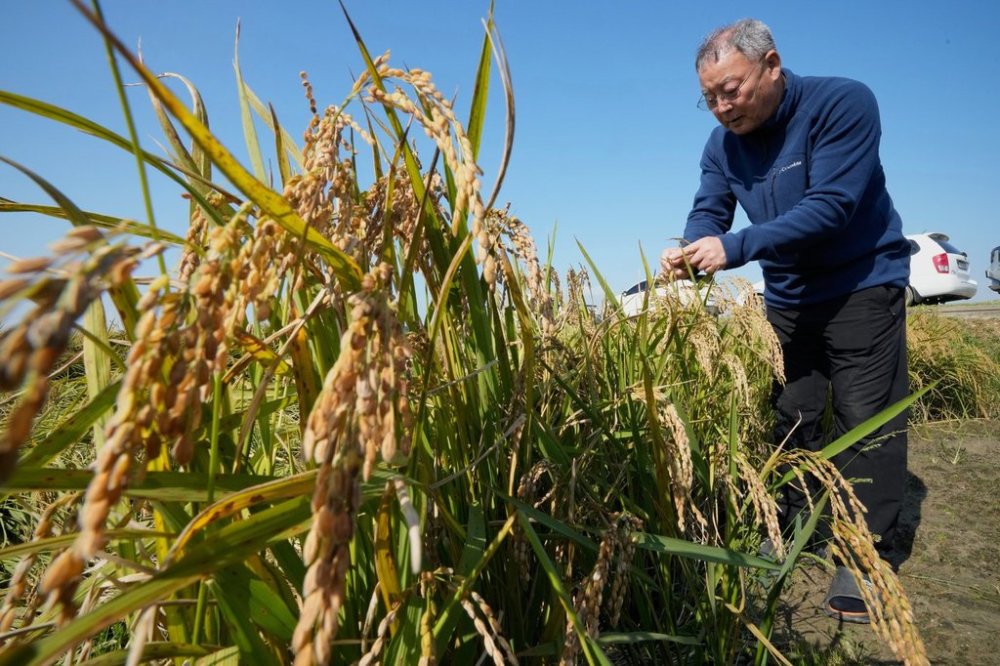World
South Korean Farmers Sue Utility for Climate Change Impact

In a landmark legal action, five farmers from South Korea have filed a lawsuit against the state-owned utility company, Korea Electric Power Corporation (KEPCO), claiming that its reliance on fossil fuels has exacerbated climate change, resulting in significant crop damage. This unprecedented case highlights the growing frustration among South Korean farmers over increasingly unpredictable weather patterns that threaten their livelihoods.
Hwang Seong-yeol, a rice farmer from Seosan, described the emotional toll of a challenging harvest season. Standing on the edge of his field, he watched a combine harvester work through muddy rice paddies, a sight he found unsettling after enduring heavy rainfall and damaging weather throughout the year. “This year’s harvest is expected to be 20% to 25% below normal,” Hwang said, reflecting a broader trend that has left many farmers questioning their future.
The lawsuit, filed with the assistance of Solutions for Our Climate, a nonprofit organization based in Seoul, argues that KEPCO’s operations have contributed to destabilized weather patterns. The farmers assert that the utility’s carbon emissions, which accounted for approximately 30% of South Korea’s greenhouse gas emissions between 2011 and 2022, should bear a share of the responsibility for the agricultural losses they are experiencing.
Impact of Unpredictable Weather on Agriculture
The case underscores the severe impact of climate change on agriculture in South Korea. In 2024, extreme weather conditions led to what the government described as “agricultural disasters,” with heavy rains destroying thousands of hectares of cropland, followed by intense heat that further damaged crops. Hwang and his fellow farmers argue that they are facing the brunt of these changes despite being innocent parties in the climate crisis.
Ma Yong-un, an apple farmer from the southeastern town of Hamyang, shared similar concerns about the challenges posed by climate change. He has noticed a significant increase in pests and diseases affecting his crops due to prolonged heat and humidity. “I think about how much longer I can carry on,” Ma stated, emphasizing that the future of farming is uncertain for him and his family.
The farmers are seeking initial damage claims of 5 million won (approximately $3,400) each, with additional symbolic claims aimed at urging the government to accelerate its transition away from coal power by 2035. Currently, renewable energy sources account for only 10.5% of South Korea’s energy mix, with KEPCO relying on coal for over 71% of its electricity production in 2024.
Challenges in Transitioning to Renewable Energy
The lawsuit raises important questions about the accountability of utility companies in the fight against climate change. Legal experts, including Yun Sun-Jin, a professor at Seoul National University, have noted the symbolic significance of the case. However, they also caution that proving direct causation between KEPCO’s practices and the farmers’ losses may be complex, given the global nature of climate change.
KEPCO has stated that it recognizes carbon reduction as a critical responsibility, aiming for a 40% reduction in emissions by 2030 compared to 2018 levels. However, the company has declined to comment on the ongoing lawsuit, citing legal constraints.
Experts argue that South Korea’s energy policies, characterized by decades of low electricity rates, have hindered the utility’s ability to invest in modernizing the power grid and expanding renewable energy sources. As the nation grapples with these challenges, the farmers’ lawsuit could serve as a catalyst for broader discussions about energy reform and climate responsibility.
As the impacts of climate change continue to manifest, farmers like Hwang and Ma are left to navigate an increasingly difficult landscape. The outcome of this lawsuit may not only affect their futures but also set a precedent for how climate-related damages are addressed in the agricultural sector across South Korea and beyond.
-

 Science3 months ago
Science3 months agoToyoake City Proposes Daily Two-Hour Smartphone Use Limit
-

 Top Stories3 months ago
Top Stories3 months agoPedestrian Fatally Injured in Esquimalt Collision on August 14
-

 Health3 months ago
Health3 months agoB.C. Review Reveals Urgent Need for Rare-Disease Drug Reforms
-

 Technology3 months ago
Technology3 months agoDark Adventure Game “Bye Sweet Carole” Set for October Release
-

 World3 months ago
World3 months agoJimmy Lai’s Defense Challenges Charges Under National Security Law
-

 Lifestyle3 months ago
Lifestyle3 months agoVictoria’s Pop-Up Shop Shines Light on B.C.’s Wolf Cull
-

 Technology3 months ago
Technology3 months agoKonami Revives Iconic Metal Gear Solid Delta Ahead of Release
-

 Technology3 months ago
Technology3 months agoApple Expands Self-Service Repair Program to Canada
-

 Technology3 months ago
Technology3 months agoSnapmaker U1 Color 3D Printer Redefines Speed and Sustainability
-

 Technology3 months ago
Technology3 months agoAION Folding Knife: Redefining EDC Design with Premium Materials
-

 Business3 months ago
Business3 months agoGordon Murray Automotive Unveils S1 LM and Le Mans GTR at Monterey
-

 Technology3 months ago
Technology3 months agoSolve Today’s Wordle Challenge: Hints and Answer for August 19









